Getting dental implants is an exciting step toward restoring your smile and confidence. But if you’re like most patients, you’re probably wondering: “How will I sleep tonight?” The good news is that with the right approach, sleeping after dental implants doesn’t have to be a nightmare. In fact, quality rest is one of the most important factors in your healing journey.
I’ve helped countless Dallas families navigate their dental implant recovery, and I can tell you that the first few nights are crucial for setting yourself up for success. Your body does its best healing work while you sleep, so creating the right environment and following proven strategies will help you wake up feeling better each day.
Key Takeaways
- Sleep elevated with your head raised 30-45 degrees for the first 3-5 nights to reduce swelling and bleeding
- Ice therapy before bed and gentle cold compresses can significantly improve comfort during sleep
- Avoid sleeping on the implant side for at least the first week to prevent pressure and complications
- Take prescribed pain medication 30-60 minutes before bedtime to ensure comfortable sleep
- Create a calm sleep environment with extra pillows, soft foods nearby, and easy access to water
Understanding the First 48 Hours: What to Expect
The first two nights after your dental implant surgery are typically the most challenging. Your body is working hard to begin the healing process, and it’s completely normal to experience some discomfort, swelling, and even anxiety about protecting your new implant.
During this initial period, your implant site is forming a blood clot—a crucial step in healing that you’ll want to protect at all costs. This means being extra careful about how you position yourself while sleeping.
Common sleep challenges include:
- Throbbing or aching pain that intensifies when lying flat
- Swelling that feels worse in the morning
- Difficulty finding a comfortable position
- Anxiety about accidentally disturbing the implant site
- Dry mouth from breathing through your mouth
The Science Behind Elevated Sleeping After Dental Implants
Sleeping with your head elevated isn’t just a suggestion—it’s based on solid medical science. When you lie flat, blood flow increases to your head and face, which can worsen swelling and put pressure on your healing implant site.
By keeping your head elevated at a 30-45 degree angle, you’re working with gravity to:
- Reduce blood pooling in the facial tissues
- Minimize swelling around the implant site
- Decrease bleeding and oozing
- Improve lymphatic drainage for faster healing
Think of it like this: if you had a sprained ankle, you’d elevate it above your heart. The same principle applies to your mouth after implant surgery.
Setting Up Your Sleep Environment for Success
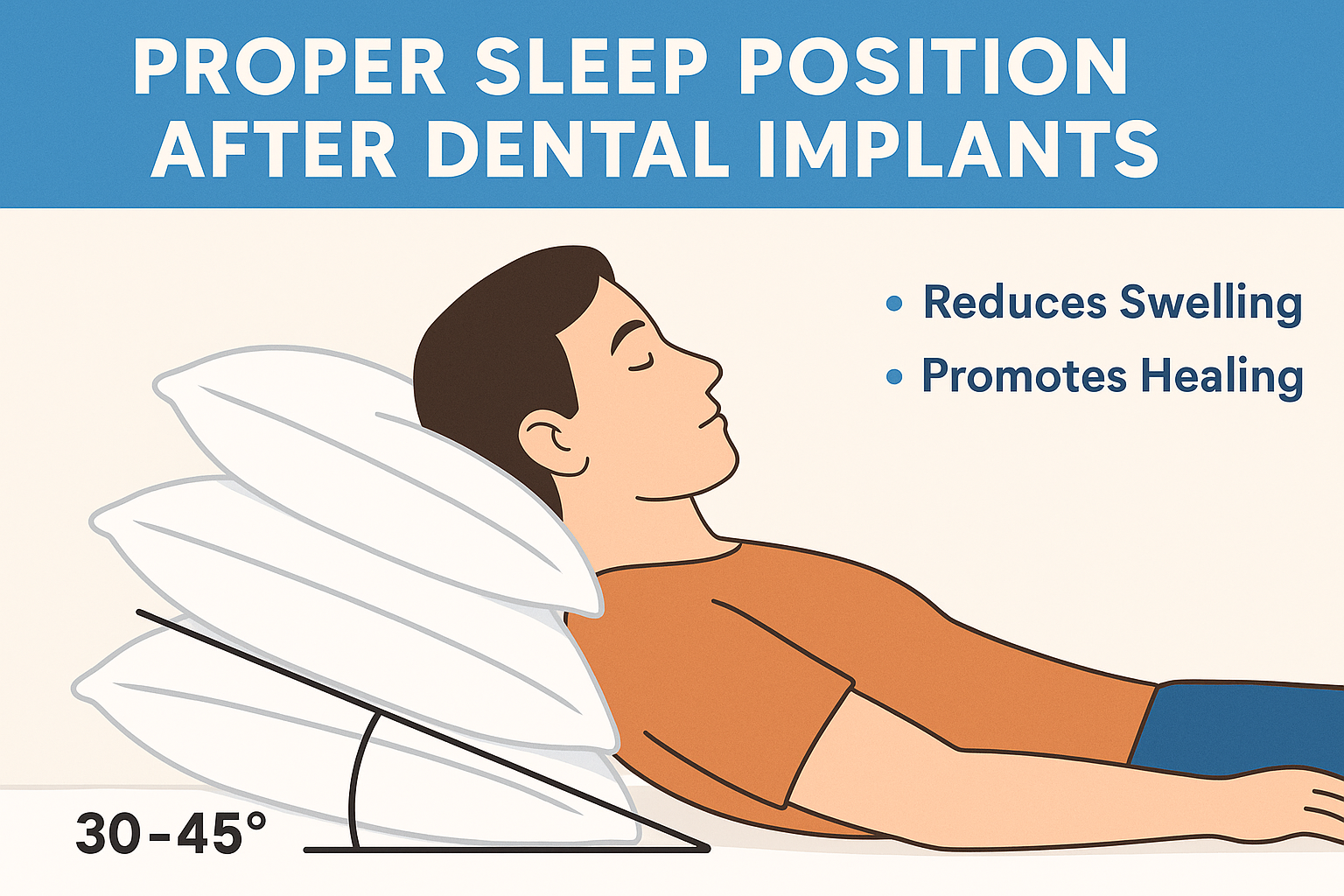
Creating the perfect sleep setup before your surgery will make those first few nights much more manageable. Here’s how to transform your bedroom into a healing sanctuary:
The Pillow Strategy 🛏️
Primary elevation: Use 2-3 firm pillows to prop up your upper body, or invest in a wedge pillow designed for post-surgery recovery.
Side support: Place additional pillows on both sides to prevent rolling onto the implant site during sleep.
Comfort layer: Add a soft pillow on top for neck comfort—you don’t want to wake up with a crick in your neck on top of everything else.
Bedside Essentials Checklist
Keep these items within arm’s reach:
- ✅ Water bottle with a straw (avoid suction for first 24 hours)
- ✅ Prescribed pain medication
- ✅ Soft tissues
- ✅ Small flashlight or phone light
- ✅ Ice pack wrapped in a thin towel
- ✅ Gauze pads (if bleeding occurs)
- ✅ Phone to contact your dental team if needed
Pain Management Strategies for Better Sleep
Effective pain management is crucial for quality sleep after dental implant surgery. The goal isn’t to eliminate all sensation—some mild discomfort is normal—but to keep pain at a manageable level that allows for restorative sleep.
Medication Timing
Evening routine: Take your prescribed pain medication 30-60 minutes before your planned bedtime. This gives the medication time to take effect before you try to sleep.
Night schedule: If you’re prescribed medication every 4-6 hours, set a gentle alarm to wake up for your dose. It’s easier to maintain pain control than to regain it.
Morning preparation: Keep your morning dose and a small snack by your bed for easy access when you wake up.
Natural Comfort Measures
While medication forms the foundation of pain management, these natural approaches can provide additional relief:
Cold therapy: Apply ice packs for 15-20 minutes before bed to reduce inflammation and numb discomfort.
Gentle saltwater rinse: After the first 24 hours, a warm saltwater rinse before bed can soothe tissues and promote healing.
Relaxation techniques: Deep breathing exercises or gentle meditation can help your body relax despite discomfort.
Sleeping Positions: What Works and What Doesn’t
Your sleeping position can make or break your recovery experience. Here’s what you need to know about finding the sweet spot between comfort and healing.
✅ Recommended Positions
Semi-upright on your back: This is the gold standard for the first week. Use pillows to create a comfortable incline that keeps your head elevated.
Slight side-lying (non-implant side only): If you absolutely can’t sleep on your back, you can carefully lie on the side opposite your implant, but still maintain head elevation.
❌ Positions to Avoid
Flat on your back: This increases blood flow to the head and can worsen swelling and bleeding.
Face-down (prone): This puts direct pressure on your face and can disturb the healing implant site.
Sleeping on the implant side: Avoid this for at least 7-10 days to prevent pressure on the surgical site.
Managing Swelling and Bleeding During Sleep
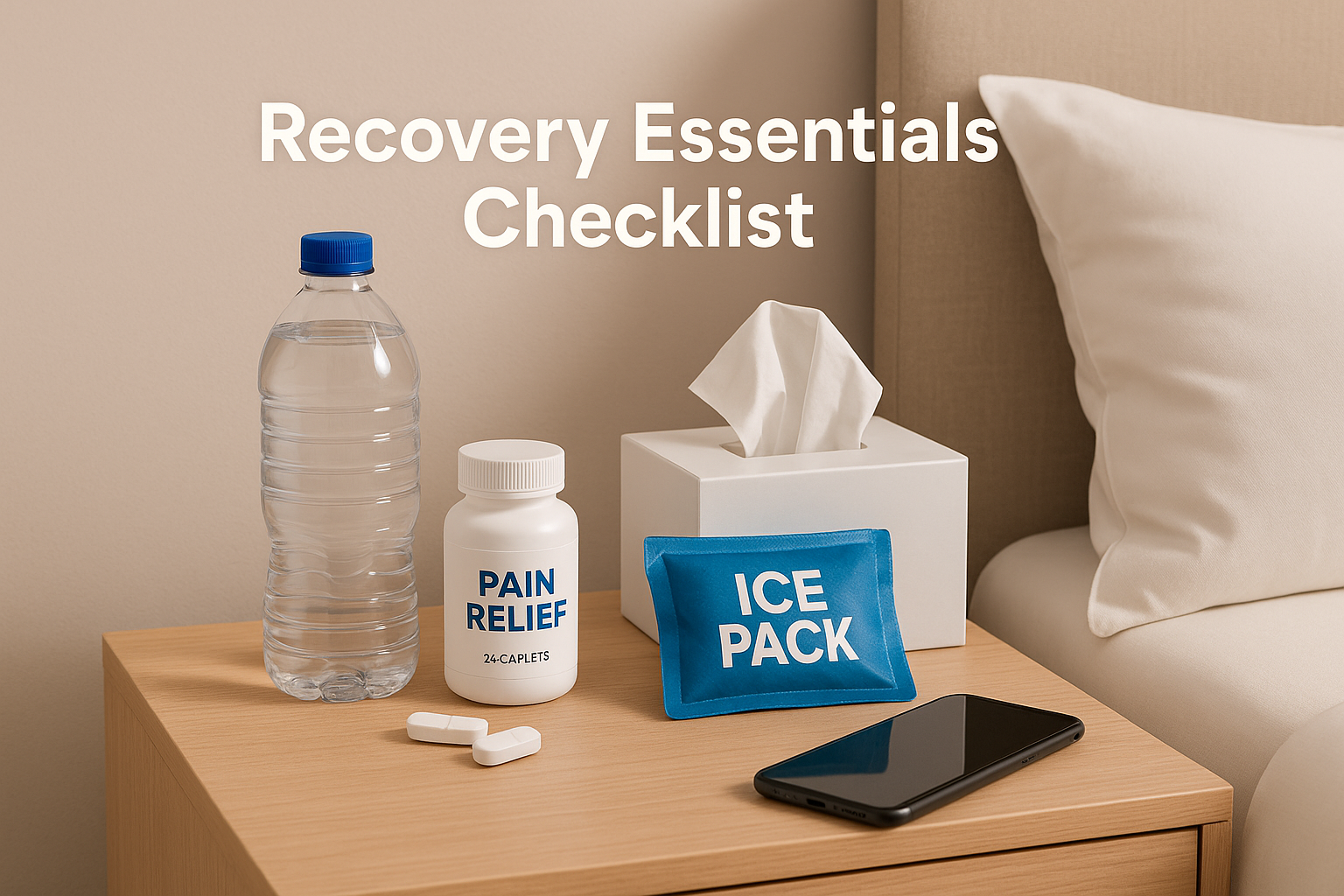
Waking up with increased swelling or minor bleeding is common after dental implant surgery. Here’s how to minimize these issues and handle them if they occur.
Swelling Prevention
Pre-sleep ice therapy: Apply cold compresses for 15-20 minutes before bed during the first 48 hours.
Consistent elevation: Maintain head elevation throughout the entire night, not just when falling asleep.
Hydration balance: Stay hydrated, but avoid drinking large amounts right before bed to minimize nighttime bathroom trips that could disrupt your positioning.
Handling Minor Bleeding
If you notice minor bleeding or oozing:
- Stay calm—minor bleeding is normal for the first 24-48 hours
- Apply gentle pressure with clean gauze for 10-15 minutes
- Maintain elevation and avoid lying flat
- Contact your dental team if bleeding is heavy or doesn’t stop with pressure
Week-by-Week Sleep Progression
Understanding how your sleep routine will evolve helps set realistic expectations and plan for each phase of recovery.
Days 1-3: The Critical Period
- Sleep elevated every night
- Take pain medication as prescribed
- Apply ice therapy before bed
- Expect 4-6 hours of sleep initially
Days 4-7: Gradual Improvement
- Continue elevation but may reduce angle slightly
- Pain should decrease noticeably
- Swelling peaks around day 3, then improves
- Sleep quality begins to normalize
Week 2-4: Return to Normal
- Gradual return to preferred sleeping positions
- Most discomfort should be resolved
- Normal sleep patterns typically resume
- Focus shifts to protecting the implant during daily activities
When to Contact Your Dental Team
While some discomfort is expected, certain symptoms warrant immediate attention, even if they occur in the middle of the night:
🚨 Call immediately if you experience:
- Heavy bleeding that doesn’t stop with pressure
- Severe pain not controlled by prescribed medication
- Signs of infection (fever, excessive swelling, pus)
- Allergic reactions to medications
- Implant feels loose or displaced
📞 Call during business hours for:
- Mild to moderate pain lasting beyond expected timeframe
- Questions about medication dosing
- Concerns about normal healing progress
- Need for additional comfort strategies
Special Considerations for Different Implant Procedures
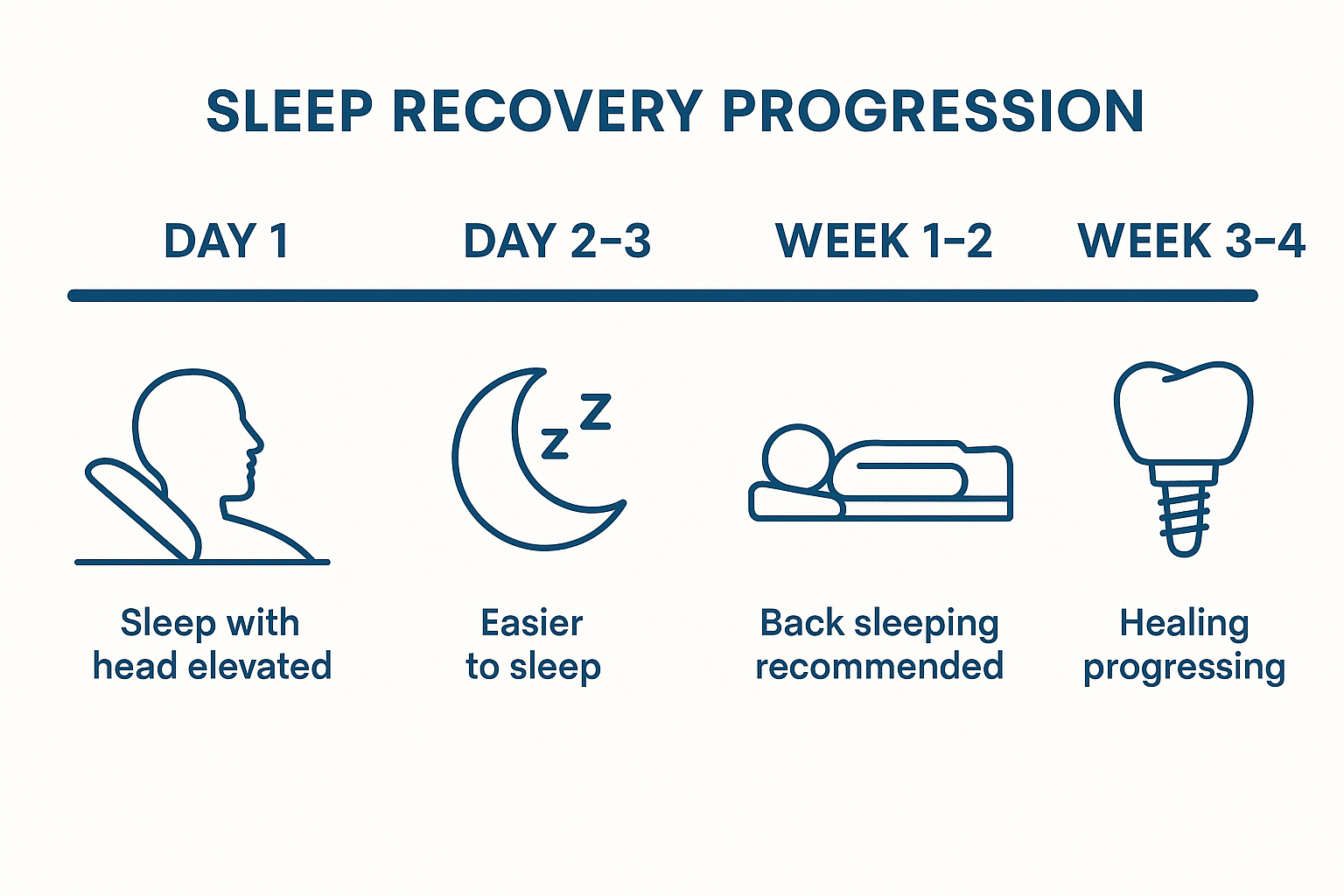
Your sleep strategy may need slight modifications depending on the type of implant procedure you’ve had.
Single Tooth Implants
- Easier positioning since only one area is affected
- Can often sleep on the opposite side sooner
- Recovery typically faster and less complex
Multiple Implants or Full Mouth Reconstruction
- Extended elevation period may be necessary
- More comprehensive pain management needed
- Longer adjustment period for comfortable sleep
- Consider full mouth reconstruction options for complex cases
Immediate Load Implants (Teeth in a Day)
- Special care needed to protect temporary crowns
- Avoid any pressure on new teeth during sleep
- Follow specific instructions for permanent teeth in a day procedures
💤 Sleep Position Calculator for Dental Implant Recovery
Your Personalized Sleep Strategy
Creating Long-Term Sleep Success
As you progress through your recovery, it’s important to gradually transition back to your normal sleep routine while maintaining the habits that supported your healing.
Building Healthy Sleep Habits
Consistent bedtime: Maintain regular sleep and wake times to support your body’s natural healing rhythms.
Sleep hygiene: Create a relaxing bedtime routine that signals your body it’s time to rest and repair.
Comfortable environment: Keep your bedroom cool, dark, and quiet to promote deep, restorative sleep.
Protecting Your Investment
Your dental implants represent a significant investment in your health and confidence. Here’s how to protect them long-term:
Night guards: If you grind your teeth, discuss a custom night guard with your dental team once healing is complete.
Regular checkups: Maintain consistent dental visits to monitor your implant health and overall oral hygiene.
Stress management: Chronic stress can impact healing and increase teeth grinding, so incorporate stress-reduction techniques into your routine.
Cost Considerations and Planning Ahead
Understanding the full scope of dental implant treatment, including recovery planning, helps you make informed decisions about your oral health investment.
If you’re considering comprehensive treatment options, explore full mouth implant packages that may include recovery support materials. Many patients also benefit from understanding payment plan options to make treatment more accessible.
For those weighing different treatment approaches, comparing local Dallas options with alternatives like dental tourism can help you understand the total value of comprehensive care, including post-operative support.
Recovery Timeline: What to Expect Beyond Sleep
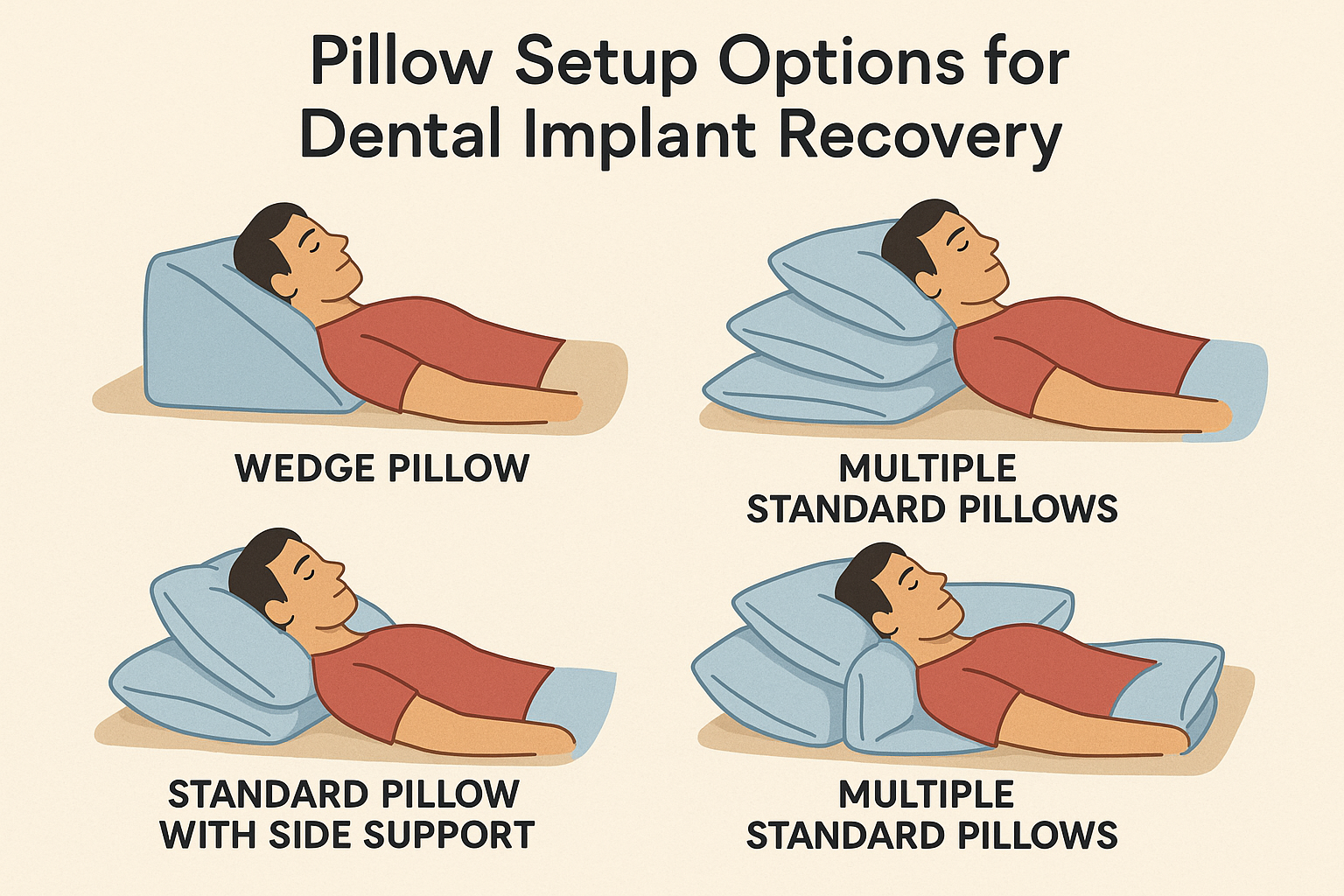
While sleep is crucial, understanding your overall recovery timeline helps set realistic expectations for returning to normal activities.
Week 1: Foundation Building
- Sleep: Elevated position required
- Diet: Soft foods only
- Activity: Rest and gentle movement
- Work: Most patients return after 2-3 days
Weeks 2-4: Gradual Improvement
- Sleep: Gradual return to normal positions
- Diet: Slowly introduce firmer foods
- Activity: Light exercise permitted
- Healing: Implant begins integrating with bone
Months 2-6: Integration Period
- Sleep: Normal sleep patterns resumed
- Diet: Most foods permitted (avoid extremely hard items)
- Activity: Full activity levels
- Healing: Osseointegration continues
Expert Tips from Dallas Dental Professionals
Based on years of helping patients through their implant journey, here are insider tips that can make a significant difference in your recovery experience:
Pre-surgery preparation: Set up your sleep area before your procedure when you’re feeling well and thinking clearly.
Partner communication: If you share a bed, discuss the temporary changes with your partner so they can support your recovery.
Backup plans: Have a recliner or couch available as an alternative if bed positioning becomes uncomfortable.
Recovery journal: Track your pain levels, sleep quality, and healing progress to share with your dental team.
Troubleshooting Common Sleep Challenges
Even with the best preparation, you might encounter some unexpected challenges. Here’s how to handle them:
“I Can’t Fall Asleep Upright”
- Try a wedge pillow designed for acid reflux sufferers
- Practice the position for short periods before surgery
- Consider a recliner chair as an alternative
- Use relaxation techniques to ease anxiety
“I Keep Rolling Over in My Sleep”
- Build a “pillow wall” on the implant side
- Consider sleeping in a narrower space temporarily
- Ask your partner to gently wake you if you move
- Use a body pillow for additional support
“The Pain Medication Makes Me Groggy”
- Discuss timing adjustments with your dental team
- Ensure you’re eating something with medication
- Stay hydrated throughout the day
- Avoid alcohol completely during recovery
The Connection Between Sleep and Healing

Quality sleep isn’t just about comfort—it’s a critical component of successful implant integration. During deep sleep, your body:
- Produces growth hormone that accelerates tissue repair
- Increases blood flow to healing areas
- Reduces inflammation through natural processes
- Strengthens immune function to prevent infection
This is why prioritizing sleep during your recovery isn’t optional—it’s essential for the long-term success of your dental implants.
Building Your Support Network
Recovery is easier when you have support. Consider these resources:
Family and friends: Ask for help with meal preparation, errands, and household tasks during the first few days.
Dental team: Don’t hesitate to call with questions or concerns, especially about sleep positioning and pain management.
Online communities: Connect with other implant patients who understand your experience and can offer practical tips.
Professional support: If anxiety about the procedure is affecting your sleep, consider speaking with a counselor who specializes in medical procedures.
Conclusion
Sleeping after dental implants doesn’t have to be a source of stress or discomfort. With proper preparation, the right positioning, and realistic expectations, you can get the quality rest your body needs to heal successfully.
Remember, the temporary adjustments you make to your sleep routine are an investment in the long-term success of your dental implants. Each night of elevated sleep brings you closer to fully enjoying your new smile with confidence.
Your journey to a better smile is a marathon, not a sprint. Be patient with yourself, follow your dental team’s guidance, and prioritize the rest your body needs to heal. Before you know it, you’ll be sleeping comfortably in any position you choose—and waking up with a smile that’s worth every moment of the recovery process.
Ready to take the next step? If you’re considering dental implants or need expert guidance on your recovery journey, contact our Dallas dental implant specialists today. We’re here to make your path to a confident smile as smooth and comfortable as possible.

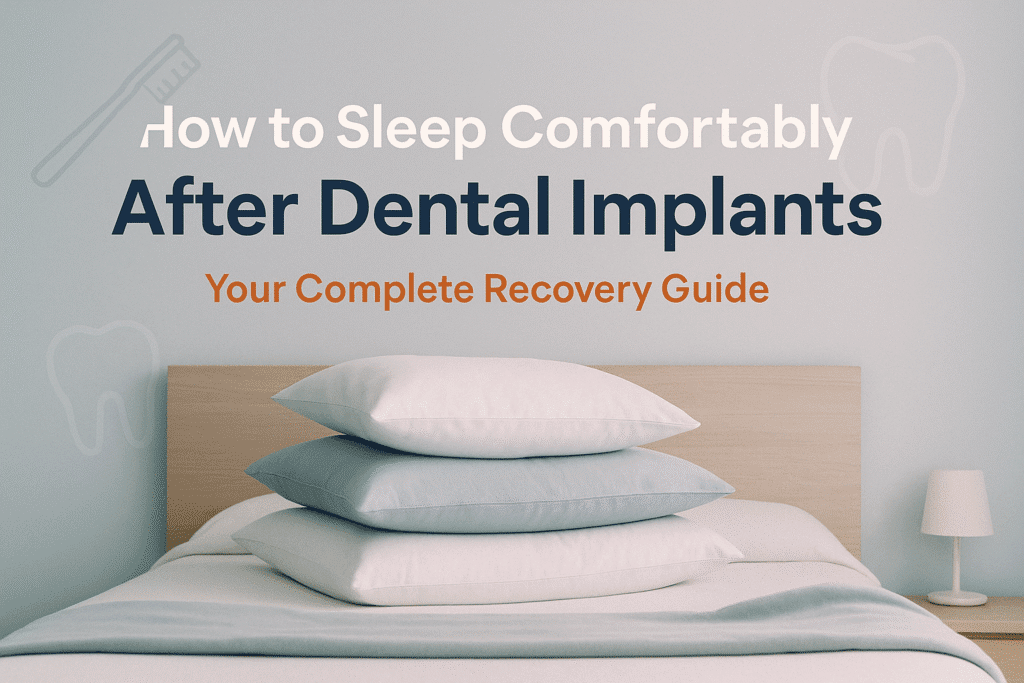
Leave a Reply
Share your thoughts or ask a question about dental implants. Your email address will not be published.